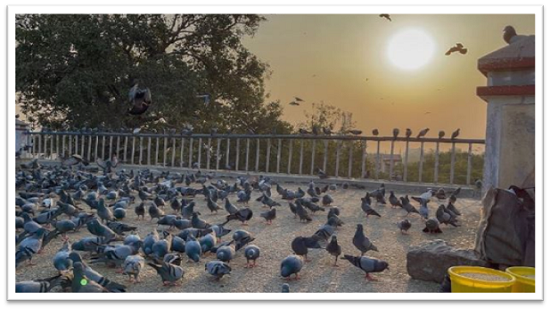
Mumbai Cracks Down on Pigeon Menace, Allows Controlled Feeding for Just 2 Hours at Designated Spots
Mumbai’s civic body, the Brihanmumbai Municipal Corporation (BMC), has announced a new policy permitting “controlled feeding” of pigeons at only four locations across the city, and strictly for two hours in the morning. This move comes amid rising health concerns and citizen complaints, following the Bombay High Court’s earlier directive that led to the closure of several traditional pigeon-feeding areas, or ‘kabutarkhanas’.
According to a civic release, this decision is an interim measure until the BMC receives recommendations from an expert committee and further directions from the Bombay High Court.
Controlled Feeding at Designated Sites
The BMC has identified four new sites for the regulated feeding of pigeons. Feeding will be allowed between 7 am and 9 am at the following locations:
• Worli Reservoir in G South Ward
• A mangrove area near Lokhandwala Back Road, close to the Versova Sewage Treatment Plant project in Andheri West (K West Ward)
• The old Airoli-Mulund check post area along the Airoli-Mulund Link Road in Mulund East (T Ward)
• Gorai Maidan in Borivali West (R Central Ward)
The civic body has emphasized that these spots have been selected to minimize health hazards and prevent disruption in densely populated or high-traffic zones.
Conditions for Permission
Permission for feeding at these newly designated sites will only be granted if voluntary organizations come forward to manage the activity. The BMC stated that these organizations must ensure strict compliance with several conditions, including maintaining cleanliness, preventing obstruction to pedestrian and vehicular movement, and addressing citizen complaints.
Additionally, organizations must submit a formal undertaking agreeing to follow all stipulated conditions. Assistant municipal commissioners of the respective wards will serve as nodal officers to monitor the arrangements, while signboards will be installed to raise public awareness about the health risks associated with pigeon feeding.
Health and Hygiene Concerns
The BMC’s move is rooted in growing concerns over public health and sanitation. Uncontrolled pigeon feeding has long been linked to a rise in respiratory diseases such as hypersensitivity pneumonitis, commonly referred to as “pigeon lung disease.”
City health experts have repeatedly warned that prolonged exposure to pigeon droppings can cause severe allergic reactions and lung infections, especially among children and senior citizens. The civic administration’s decision to regulate feeding hours aims to limit such exposure while maintaining the ecological balance.
Old Feeding Spots to Remain Closed
Clarifying its position, the BMC stated that existing ‘kabutarkhanas’ or traditional pigeon-feeding zones that were shut earlier following High Court orders will continue to remain closed. These include popular spots like the one at Dadar, which had been covered with plastic sheets in August to discourage public feeding.
The civic body reiterated that no previously closed feeding zones have been permitted to reopen, and that the current initiative only applies to the four new controlled locations identified under this temporary arrangement.
Massive Public Response
The pigeon-feeding issue has sparked significant public interest. According to the BMC, it has received 9,779 objections, suggestions, and complaints from citizens regarding the matter. These inputs cover a wide range of concerns, including the hygiene and cleanliness of pigeon-feeding areas, the impact of droppings on nearby buildings, and the need for regulated feeding zones.
The volume of feedback reflects how deeply the issue affects urban life in Mumbai, a city where feeding pigeons is often seen as a cultural and religious act but has increasingly become a public health challenge.
Balancing Tradition and Public Health
The BMC’s latest decision attempts to strike a delicate balance between respecting traditional practices and addressing health and sanitation risks. Officials have indicated that the civic body is open to adjusting the policy based on the findings of the expert committee and subsequent High Court orders.
Until then, the “controlled feeding” framework will serve as a pilot project to assess whether regulated activity can help reduce overcrowding of pigeons in public areas and mitigate associated health hazards.
A Step Toward Cleaner, Healthier Public Spaces
Urban ecologists and civic planners have lauded the move as a necessary intervention. Unchecked pigeon populations contribute to the degradation of heritage structures, cause sanitation issues, and create cleaning burdens for residents and shop owners.
By restricting feeding hours and locations, the BMC aims to gradually shift the city toward responsible coexistence with urban wildlife while prioritizing public health.
As Mumbai awaits the expert committee’s report, the civic body’s decision signals a proactive step toward cleaner surroundings and a more regulated urban environment.
In a city where space, health, and heritage often collide, this initiative could become a model for other metropolitan areas seeking to manage the intersection of culture and civic responsibility.




